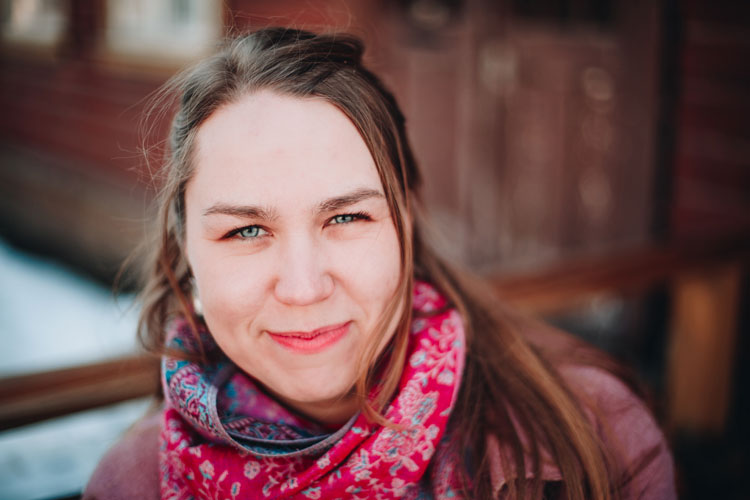Mari Kalkun, a prominent folk musician and songwriter from Estonia, was born in Võrumaa, a southeastern region of Estonia. She resides in a farmhouse built by her paternal great-grandfather in 1900. Mari’s family has deep roots in the Võrumaa region, spanning generations.
Music has been an integral part of Mari’s life since birth, describing an innate and magnetic connection to it. Her journey with music started with piano lessons at the age of five. Mari actively engaged in local singing traditions, participating in birthday celebrations, anniversaries, and even intimate singing sessions in the sauna, reflecting the rich culture of savvusann smoke saunas, recognized by UNESCO as intangible heritage.

Transitioning from classical music to local runo-songs (regilaul), Mari’s interest led her to form a band during high school. Significantly, her debut performance at the Viljandi Folk Music Festival (the biggest in Estonia) marked a pivotal moment, igniting her passion for stage presence and musical enchantment. “I was 15 or 16 when I played my first show at Viljandi Folk Music Festival. It was a large crowd of 1000 people and I got my first adrenalin ‘wow’ of being on stage, communicating with people and feeling what the magic of music is.”
Subsequently, Mari pursued studies at the Viljandi Culture Academy, mastering accordion and kannel, the Estonian zither. Her academic journey continued at the Estonian Music Academy in Tallinn, where she pursued a master’s in traditional singing and runo-songs, even spending time at the Sibelius Academy in Helsinki, Finland. “In Finland it’s a bigger [musical] community than in Estonia, so it was a liberating and broadening experience to be part of that.”
Hailing from Võrumaa, Mari treasures the Võro language, a linguistic gem with deep historical roots. She emphasizes its importance, acknowledging its connection to her ancestors and the wounds from the past when the language was suppressed during Soviet times. Despite the linguistic distinctions, Võro hasn’t yet been recognized as an independent language by the Estonian government. “The Võro language is very important for me,” she says. “There are still wounds from Soviet times, when the language was banned, and you were humiliated if you didn’t speak proper Estonian. But Võro is very old and spoken for 2000 years in the region. Contemporary Estonian language is a much newer creation and based on North Estonian dialects rather than South. There are many differences between these two languages, and I am deliberately saying languages because linguistically they are two different languages. Võro has very old layers of tradition that connect me to my ancestors.”
Mari Kalkun also champions contemporary Võro writers, setting lyrics by Jaan Kaplinski, Leila Holts, and Triinu Laan. The poem “My Dying Language” by Triinu Laan encapsulates Mari’s mixed emotions about the state of the language; a powerful reflection on the uncertain fate of Võro. She considers Võro and Estonian languages as fragile ecosystems akin to nature, embodying a core theme in her musical expression.
Notably, in May 2020, Mari delivered an exceptional performance filmed and recorded in the blossoming apple orchard around her house. This concert was released as Õunaaia (Apple Orchard). “It’s amazing that my grandmother planted these trees and I can still taste the apples from them. It’s like a magical thing. Of course, it’s not only about the trees, but the whole place and the roots in the nature.”

In her 2023 album Stories of Stonia, co-produced with British musician Sam Lee, Mari draws inspiration from Võrumaa’s landmarks, weaving traditional elements with her own unique perspective. Her music echoes a message of creating a personal mythical realm while acknowledging the power of choices in shaping the world.
(headline image: Mari Kalkun – Photo by Ruudu Rahumaru)
Discography:
Üü Tulõk (Õunaviks, 2007)
Vihmakõnõ (Õunaviks, 2010)
Upa-Upa Ubinakõnõ, with Ramo Teder, Tuulikki Bartosik (Võro Instituut, 2015)
Tii Ilo, with Runorun (Rockadillo Records, 2015)
Ilmamõtsan (Nordic Notes, 2017)
Õunaaia Album – Apple Orchard Album (2020)
Petserimaa Igatsus (2021)
Stoonia Lood – Stories Of Stonia (Real World Records, 2023)


